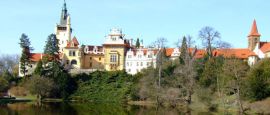Vilnius History
According to Lithuanian folklore, Vilnius was built upon a dream. After hunting in the forests in the Šventaragis Valley in the early 14th century, the Grand Duke of Lithuania, Gediminas, had fallen asleep.
He dreamt of a large iron wolf atop a hill, howling as loud as a pack of 100 wolves. When he woke, he asked the priest Lizdeika to interpret his dream. He was told to build a city here as the iron wolf represented the fame of the future city spreading far and wide.
In 1323, Gediminas erected a wooden castle on top of a nearby hill, and named the city below Vilnius, after the nearby Vilnia River.
Gediminas sent news of the city to various towns across Europe, inviting the Jews and Germans from the Hanseatic League to visit. By the end of the 14th century, a German medieval military order called the Teutonic Knights had all but destroyed the city and castle. The knights were finally defeated in July, 1410 at the Battle of Grunwald, one of the largest battles in medieval Europe.
Vilnius was then rebuilt with huge city walls, allowing it to grow in stature, size and influence. No invitations were dispatched ahead of the Russians taking the city in 1655, nor before the Swedish occupied it in both 1702 and 1706.
After the Third Partition of Polish-Lithuanian Commonwealth in 1795, Vilnius was annexed by the Russian Empire. The 120-year Russian occupation was interrupted when the French, led by Napoleon, stormed the city in 1812. The French did not enjoy much success, however, as 40,000 soldiers died here due to cold and starvation.
The next invasion came in 1915 when German occupied Vilnius during World War I, and again in 1941 during World War II. When the German withdrew in 1944, the Soviets took back control once again. It was only after the Soviet coup attempt of 1991, the Soviet Union finally acknowledged the independence of Lithuania.
On 1 May 2004, Lithuania joined the European Union and in 2015, it adopted the euro.
Did you know?
• Lithuania was the last pagan country in Europe, accepting Christianity only in 1387.
• Vilnius was once known as the 'Jerusalem of the North', but the Nazis slaughtered most of the Jewish population during WWII.
• Founded in 1579, Vilnius University is the oldest university in the Baltic states.
• Vilnius was a European Capital of Culture in 2009.
Do you have any Feedback about this page?
© 2026 Columbus Travel Media Ltd. All rights reserved. No part of this site may be reproduced without our written permission, click here for information on Columbus Content Solutions.




 You know where
You know where